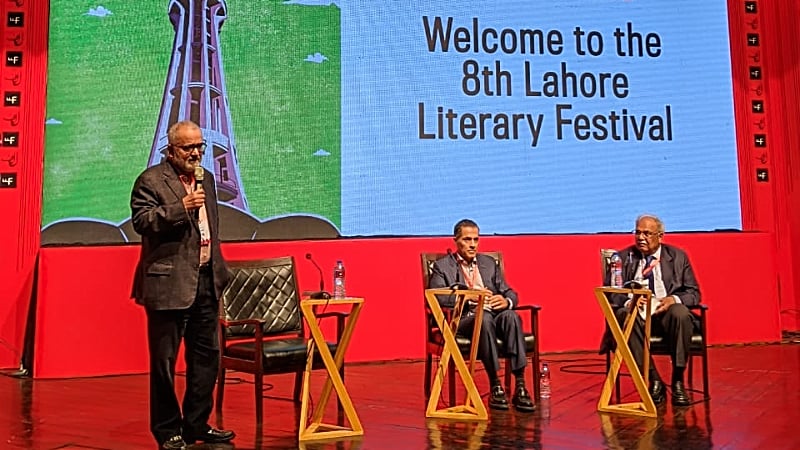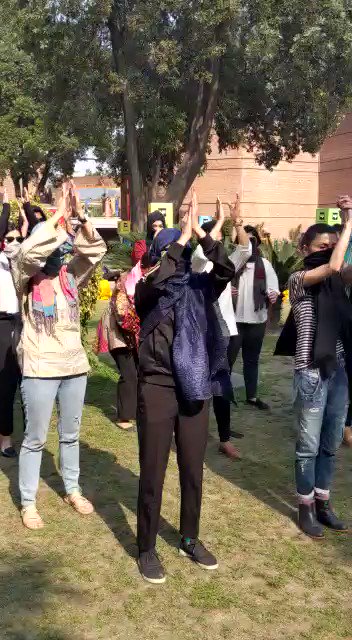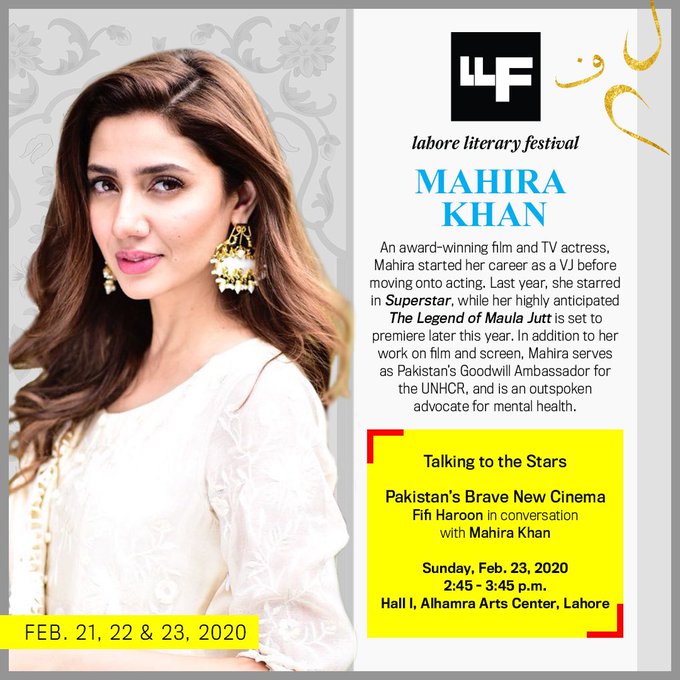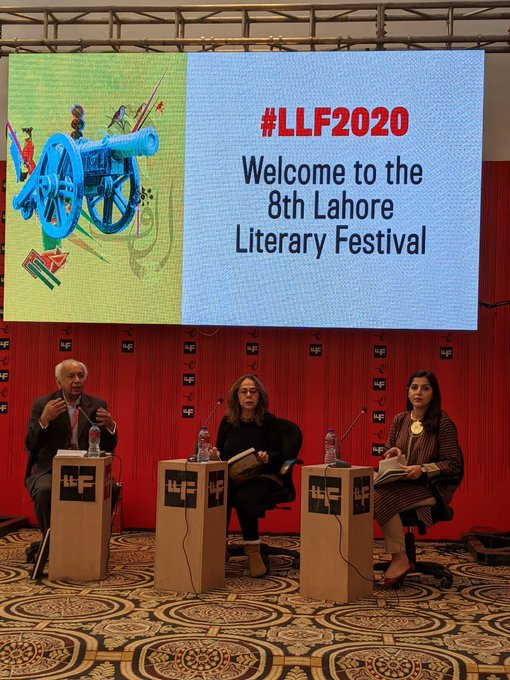
It’s the last day of the Lahore Literary Festival!
The opening ceremony of this year’s LLF kicked off with Qawwali and Razi Ahmed delivering the Keynotes addresses. Day 2 featured book launches and interesting sessions. You can check out our coverage for Day 1 here and Day 2 here.
Team Images is back at Alhamra to cover Day 3 of LLF. Stick with us as we keep you updated in real time about whats happening at LLF 2020. You can also check out the complete schedule here.
03:00pm : The Meditative Dot
Art commentator for The Guardian, Jonathan Jones, in conversation with celebrated contemporary artist Waqas Khan in a panel moderated by Rabiya Jalil.

“My idea as to create a dialogue that I can connect to the world. That was a little desire that I had. I’m looking at life in a very different way,” says Waqas Khan.
Jonathan calls Waqas’ work visual and sensory in nature, saying, “It’s not easy art, like something figurative or something with something with obvious content that people can latch onto. This doesn’t give you those things. Exoticism, I think, it’s a genuine one to one encounter with Waqas’ work. I don’t think people like it because it’s exotic, the quality of it is extraordinary.”
02:20pm : Performance of Chilean rape song in Urdu
Chilean protest song about rape culture and victim shaming was performed at #LLF2020 in Urdu. The song ‘Un Violador en Tu Camino – A Rapist in Your Path’ has become a viral anthem for feminists around the world.
#Day3 #HappeningNow #MeTooPakistan
01:39pm : Cricket, citizenship and the post-colonial narrative
Author of The Fix Omar Shahid Hamid and Romesh Gunesekera sit in this session moderated by Georgina Godwin.

“We’re all cricket crazy and we all love conspiracy; the perfect fixture of that is match-fixing. The element of women’s cricket was interesting because it’s always been the underdog, no one gave it a chance,” says author #OmarShahidHamid talking about his book, #TheFix. #LLF2020
“Cricket is a very South Asian spectacle, where a lot of emotions run high,” says Romesh Gunesekera.
Omar Shahid Hamid says, “When I decided to write about cricket I found that, especially in South Asia, we’re all cricket crazy and we all love conspiracy. the perfect fixture of that is match fixing. The element of women’s cricket was interesting because it has always been the underdog. No one gave it a chance.”
“The premise of my story is that what if women’s cricket explodes. And it brings a lot of success but at the same time it brings negative elements such as match fixers and bookies.”
01:32pm : Ijtimai zahanat ka zawal
The hall is packed for this session where Arfa Saeeda Zehra sits with Wajahat Masood.

Masood starts off by saying, “It would be wrong to say a society doesn’t have wisdom.”
According to Arfa Saeeda, “Whenever people like me speak the truth, we’re told we’re promoting dejection.”
12:47pm : Mahira Khan won’t be joining LLF
Mahira Khan has just announced that she wasn’t able to make it to Lahore and will sadly miss her session that was supposed to happen today.
I regret to inform all of you that I couldn’t make it to Lahore this morning. I am extremely upset about this. Was looking forward to it for a while.
I am so sorry to all those who were coming for it. Please do pass it on to anyone else you know who was going to attend. https://twitter.com/lhrlitfest/status/1230097040778125314 …LLF@lhrlitfest#LLF2020 #popular #culture #literary #film #activism come for scintillating conversations and discussions at the eighth edition of the LLF beginning 11 am Friday, Feb 21 #Alhamra #Arts @TheMahiraKhan
12:45pm : Qawwali break!
The next round of sessions begin at 1:20pm so we’re just enjoying the vibe out here!
We’re enjoying the show with some amazing gelato by Cosa.

11:32am : Power, politics and betrayal in Mughal Lahore
SOAS University of London specialist on the art and architecture of Mughal South Asia Mehreen Chida-Razvi speaks about the tomb of Jehangir.

According to her, “Mausoleums develop a shrine culture around them. People think people buried here emanate spiritual power.”
11:26am : Brokering peace in Afghanistan
Vali Nasr and Riaz Mohammad Khan have a conversation moderated by Ahmed Rashid.

On changing priorities, Vali Nasr says, “There was a lot of talking about talking to the Taliban but nothing substantial. Obama and Trump may be different in many ways but they both want out of Afghanistan. If anything Trump is serious about it. War fatigue has grown – you have a generation that has come of age after or during 9/11 that see wars as expensive catastrophes. They don’t glorify war and would much rather have the government pay off student loans.” Vali Nasr on how priorities are changing.
“Trump is not one to be bullied or goaded by the military into following a strategy. He can mock generals or fire them. When he came in he said why is this war taking so long and what does it take to end it. When he was told they needed more time and troops he said wrong answer and threatened to privitise the war.”
Vali Nasr speaks on how the public is moving away from the war on terrorism because Trump’s rule has changed the problems people care about. This has serious implications for Afghanistan and peace therein.
According to him, “Half of America thinks that the existential threat to America is Trump himself. The other half things it’s not Arabs or Muslims but Mexicans and Guatemalans – migrants.”
Sherry Rehman, who is sitting in the audience for this session, asks Vali, “Why would the Taliban in this reduction of violence mode not try to retain their fighting post. Who guarantees the rights of the women in the country?”
Vali answers, “We’re living in interesting times, we never thought Haqqani would write for NYT, which is essentially a love note to Trump. There’s no doubt that women’s rights are the sacrificial lambs. The fear is that there’s going to be a decent interval and that Taliban are going to hold their fire and live by the agreement and that after that they can can resume fighting under any pretext and America is not going to come back.”
11:13am : Digital Trumps Print?
Arif Nizami, Munizae Jahangir, Zafar Siddiqi, and Marium Chaudhry sit on a panel moderated by Benazir Shah to have a discussion on how ‘traditional media outlets are coping with the rise of social media.’

According to Munizae, “Due to self censorship, a lot of stories don’t make it to the people. Social media still remains free. It is a voice of the oppressed. the media landscape has been democratised.
10:35am : Book Launch for Beydari
Actor, writer, comedian Beo Zafar and translator Asma Nabeel sit in conversation with Shaukat Fareed.

Talking about her switch from comedian to the serious nature of the book’s content, Beo says, “Life is not a straight line, and as a culture we want to show that everything is fine. But you’ve got so many comedians who transform tragedy into comedy. It’s just two ends of the spectrum really.”
“I was a time waster and a dreamer. I wanted to know for the sake of knowing. My mother used to say that you if you write you should be read, if you sing you should be heard, and if you dance you should be seen. After she passed away, I think the child in me died. I then did everything after that.”
10:09am : Book Launch for The Anarchy
Author William Dalrymple gives a presentation on post-Mughal politics.

According to Dalrymple, “”When you see one of the gorgeous houses that look like Colin Firth is about to tumble out of, the money to build them has come out of South Asia and the West Indies.”
“At no point in its history did the East India company ever send out more than 2,000 white British soldiers, yet those 2,000 manage to conquer the area. Britain contributed 7% to the GDP while the Mughal empire contributes 30%. One British company runs out of one office in London and takes over the empire. How does it do it? It goes to South Asia, borrows money from Hindu Marwaris, and then trains South Asian able-bodied men to fill in their sepoys. It wasn’t white men that did the conquering, it was a brown sepoy army.”
He adds, “The conquest of India was bought as much as it was fought. The fact that Indian money lenders saw the company as a more reliable source of funding and business was the reason why they consistently back the company against the Mughals and the Marathis, because it is a company that understands money, loans and interest.”
 Jago Times "English Edition" Best Online Newspaper
Jago Times "English Edition" Best Online Newspaper





